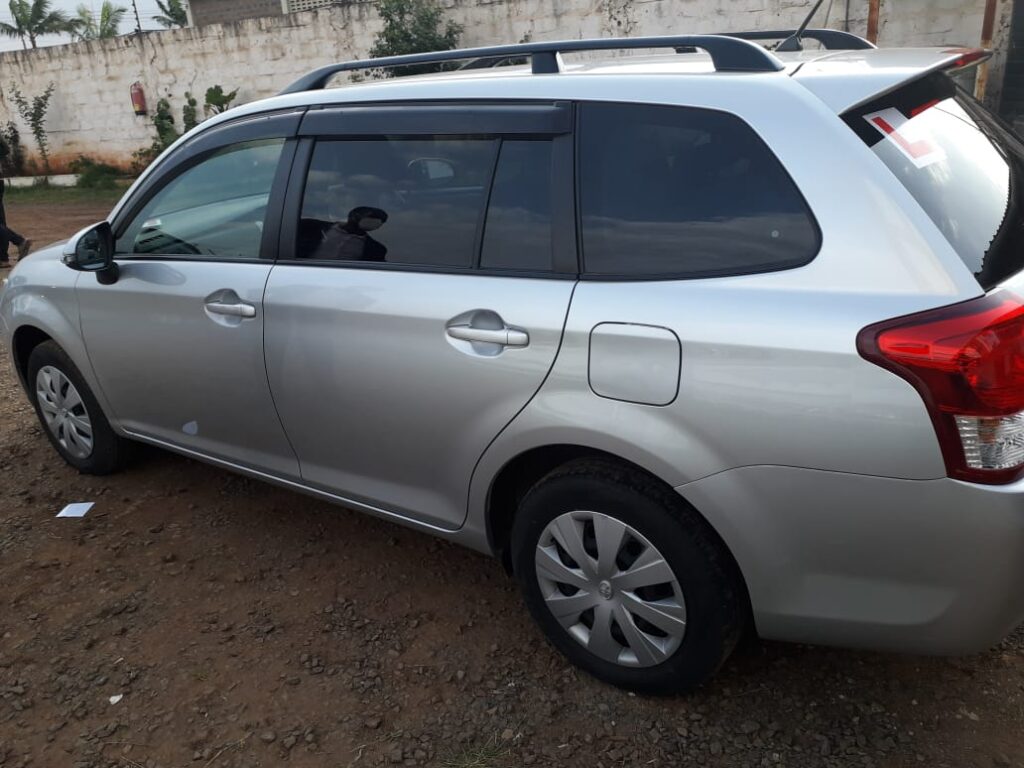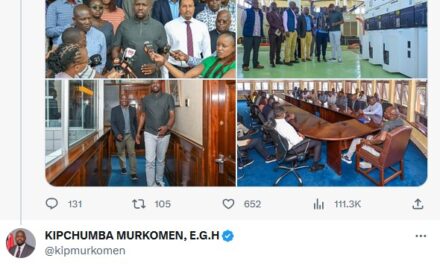As a minimalist, I lived without a car for years. As an Architect, it was really inconvenient, but luckily, we had a company car that we used to attend site meetings and inspections.
Earlier this year, I decided to get myself a good, efficient car that I could use for work purposes and as a family car. After doing research, I settled on a Toyota Fielder. It’s pretty efficient, spacious, reliable, and good-looking for its category of vehicles. It is the go-to car for small business people and consultants.

After settling on a Toyota Fielder, the next decision was to buy a locally used car or an imported one (foreign used). I settled on a foreign-used one. By then, they were retailing at KSh.1.45m for the 2014/2015 version. There are many reasons why you should opt for a new or foreign used car.
I looked for referrals for the best car yards in Nairobi and Mombasa. After comparing prices online, I decided to buy the car from a yard in Nairobi.
Referrals are good, but they can also work against you. In one instance, a friend referred me to a car seller who had sold him two cars. I called the seller and highlighted all the details I wanted about the Toyota Fielder. He mentioned he already had an excellent Fielder in his car yard and would sell it to me for KSh.1.35m. The car mileage was 90,000km. What a deal! I said to myself. I promised to visit the yard within a week. I was still exploring other options. A week passed, and the seller kept reminding me to visit the yard as other buyers were asking about the car, and he threatened to sell it to them if I didn’t make a deposit of Kshs. 50,000. I had heard about conmen escaping with customers before, so I didn’t send anything, no matter how genuine the seller looked.
Days later, I visited the yard in the company of a mechanic friend. I saw the car, and it was indeed a masterpiece. Very clean and elegant. There was no sign of rust anywhere. When we wanted to countercheck the mileage, the seller hesitated and pretended he didn’t know how it was done. He went to some website that was not working. After about five minutes, I checked the mileage through the Quality Inspection Services Japan (QISJ) website. The actual mileage was 245,000km. The seller pretended to be surprised, and we immediately left the yard without a word. I later discovered that the yards along that area are notorious for rewinding car mileage to fool their customers. After a long search, I eventually got a good car with good mileage in a car yard along Ngong Road. This was after a long, intensive search through car websites in Kenya.
On D-Day buying the car, I tagged along a friend and a mechanic. I paid the money halfway through the bank and the rest in cash. Since I was a learner driving my own car, I was also advised to buy and use the L-sticker.
As a Nairobi driver, you realize speed limits are for learners. The learners with a red ‘L’ prominently stuck on their front or rear windscreen or both. I had the L stickers for a while but realized that most people hooted at me even as I slowed down to avoid plunging into a pothole. The other drivers will overtake you even at a sharp corner because you have an ‘L’; they assume you fear speed. It’s even worse if it’s L and a small car.
“L is for Lunatic. Watch out for them. Hoot at them, overtake them. But do not get too close. They will panic and crash into you.”
A few weeks later, I yanked the stickers off.
Here are more tips for first-time car buyers in Kenya:
- Confirm the car’s actual owner through the NTSA online system for checking the same. Countercheck the Logbook details with the details shown in the NTSA system and ensure they are the same. Link for the NTSA: https://timsvirl.ntsa.go.ke/#!/login
- Have a mechanic confirm the car’s condition. You may also need a car electrician to verify the electrical and electronics section of the car. Ensure the vehicle is in good condition and has all the accessories and tools, such as the Car Jack, Jack Adjuster, Spanner, and Spare Wheel. Get your mechanic (or a friend) to countercheck the engine and chassis number against the logbook details. While at it, have him check oil changes, tyre condition, and previous repairs.
Here is a checklist that you can use:
- Confirm the accurate car mileage through the online system and countercheck with what’s on the car mileage dashboard. Check the Car Mileage here: https://www.qisjp.co.uk/verify-mileage.php
The lower the mileage, the better the car. A mileage below 110,000km is good enough.
- Countercheck the engine serial and chassis numbers and ensure they are the same as the NTSA and logbook records. You have to check these physically from the car.
- Confirm the payment details. Ensure you pay the money to the owner of the car. Check the bank account details of the owner. Don’t send the money to the broker or agent but to the real owners of the vehicle, as confirmed in point 1 above. Do not pay in CASH. Instead, pay through bank transfer or other means where it’s possible to track the payment details. Ensure you get an invoice and a payment receipt.
Once more, avoid paying cash for your car; this will reduce the chances of getting robbed or transacting with fake money in the case of sellers. Instead, ask them to deposit the money in the bank and bring the receipt, which you can confirm before you part with your car.
Do not pay a “Commitment fee” to anyone. Do not let the seller pressure you into buying the car. Car salespeople are known for being pushy and saying or doing everything to close a sale. It’s crucial to avoid being pushed into purchasing before you’re ready or have gone over your options. If you’re a first-time customer, a salesperson will be able to tell, and they won’t be reluctant to utilize that information to their advantage.
- There shall be a sales agreement, which must be signed by you, a witness and the seller.
- The original logbook must be transferred to you immediately, and you must apply for a new logbook. The car seller facilitates that process. Also, the car ownership transfer should be initiated immediately through the NTSA portal.
- If you are a new driver, do not forget to carry your driver’s license.
- If a new driver, get the L signs to be put on the back and front screens of the car.
- Buy the car insurance as well at once. If not possible, get the insurance sticker as a remedy as you plan to buy insurance.
- Service the car immediately after buying it.
Other considerations when buying a car:
- Is it hybrid or non-hybrid?
- Is it a 2WD or 4WD?
- Auto or Manual?
Other Important Considerations:
1. Should You Import Or Buy Locally
If your finances do not allow you to buy a brand new car, you can purchase a foreign used car in good condition. The question that you are now faced with is whether to import the car or buy a locally used option.
Importing is the cheaper option even with the added taxes: if you import with a good company, the time taken to import and pass the car through the ports won’t be long. Buying a locally used option, the price will be much higher, and if you are not buying from a credible car dealer, you might be tricked into buying a stolen car or one that needs lots of repairs.
2. Availability Of Spare Parts
The quality of Kenyan roads has dramatically increased over the last decade; unfortunately, there are still a number of city roads and rural roads which are filled with potholes or completely unpaved. With this in mind, you need to consider the possibility of your car getting damaged as you drive.
With this in mind, all first-time car buyers need to look for cars with spare parts that can be easily found at car garages. Car models like Toyota, Subaru, Nissan, Mazda, Honda, Range Rover, VW, and Mitsubishi are very popular in Kenya, and it is easy to find spare parts and mechanics who can easily fix damage to your car.
3. Consider the Type of Car You Need
There’s no shortage of different kinds of cars for sale, so the first thing to consider is how you’ll use your car. You might want to buy a dream car, but it might not fit your lifestyle. Evaluate your family’s needs, the demands of your commute and the vehicle’s central purpose before narrowing down your selection.
For example, if you have a family of six, you will need a vehicle with more seating like a Noah, Stream or Alphard than a typical sedan like Axio. Or, if you have a long commute every day, you might need a car with better gas mileage.
4. Shop Within Your Budget
Your shopping strategy must be based on deciding among the cars you can afford, not the cars you want. The most common mistake is buying a car that’s too expensive, given the shopper’s budget. The best way to combat this is to work out a budget, figure out what cars or what kinds of cars are within your budget and start there.
5. Don’t Let Price Be the Only Factor
For most people, the price is a major determining factor when buying a car — but don’t let it be the only factor. Sacrificing quality for the price is likely to cost you more money in the long run.
The biggest mistake people make when purchasing a car is they buy for the price, not for quality. So, ensure the vehicle has gone through a rigorous quality inspection so you can feel confident it will last for the long haul.
6. Compare Prices
If you drive around Nairobi for a day, you will find numerous car dealers lining the streets. It is tempting to spot the car you want and thereafter begin the purchase process; however, this is not the smartest idea.
What you should do instead is visit several car dealers and compare the prices you get. You can also use alternative methods like Sunday car bazaars. You will find that the price at which you buy your first car will be much lower than the original quotation you got. But the best deal is importing with a credible company.
7. Buying Insurance
Before you buy your first car, it is vital that you check the costs of collisions and liability so that you are not left in debt if you are involved in an accident. There are several quality insurance companies in Kenya, such as UAP, CIC Gemini a, AA, Heritage Insurance and Madison Insurance, to name a few.



